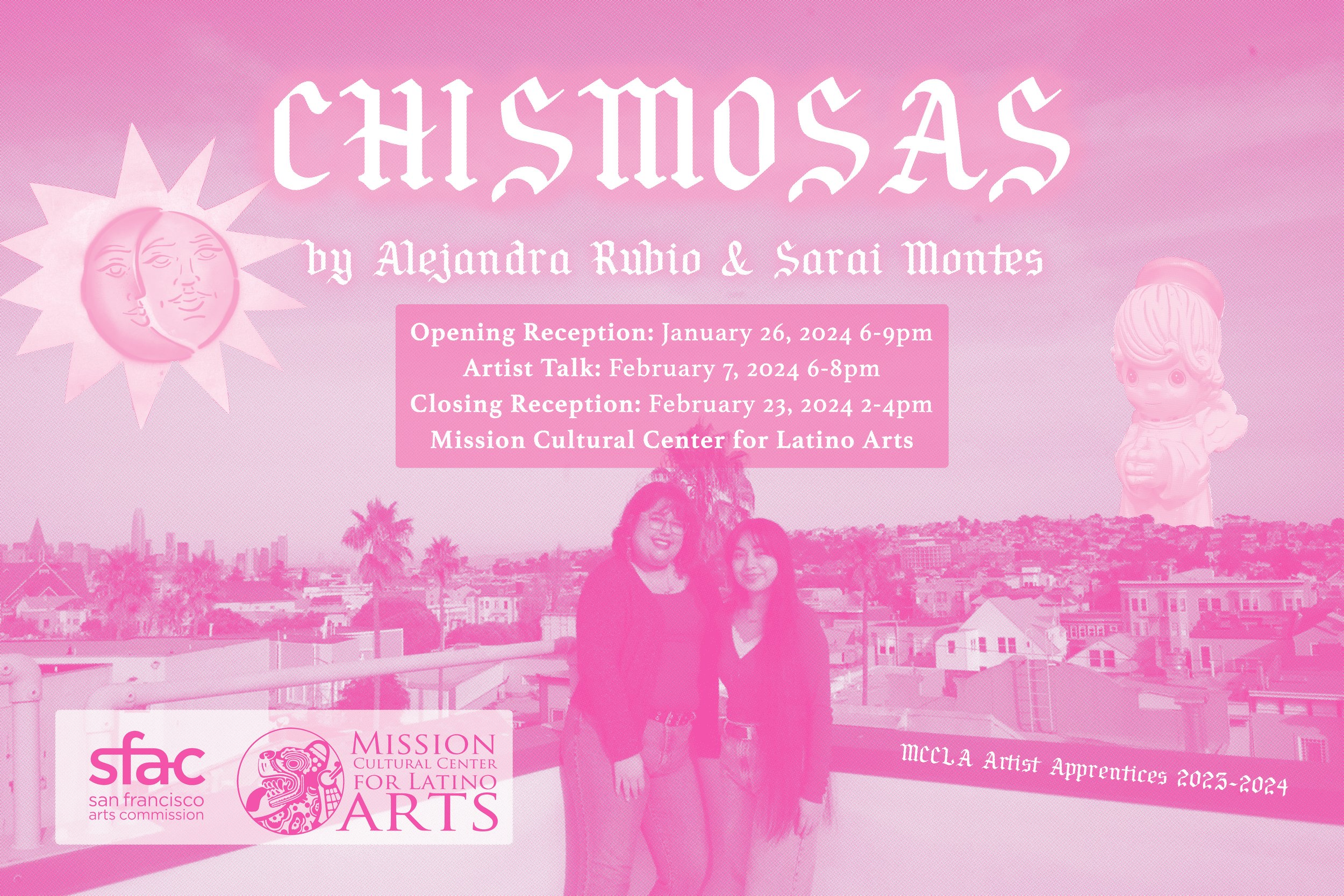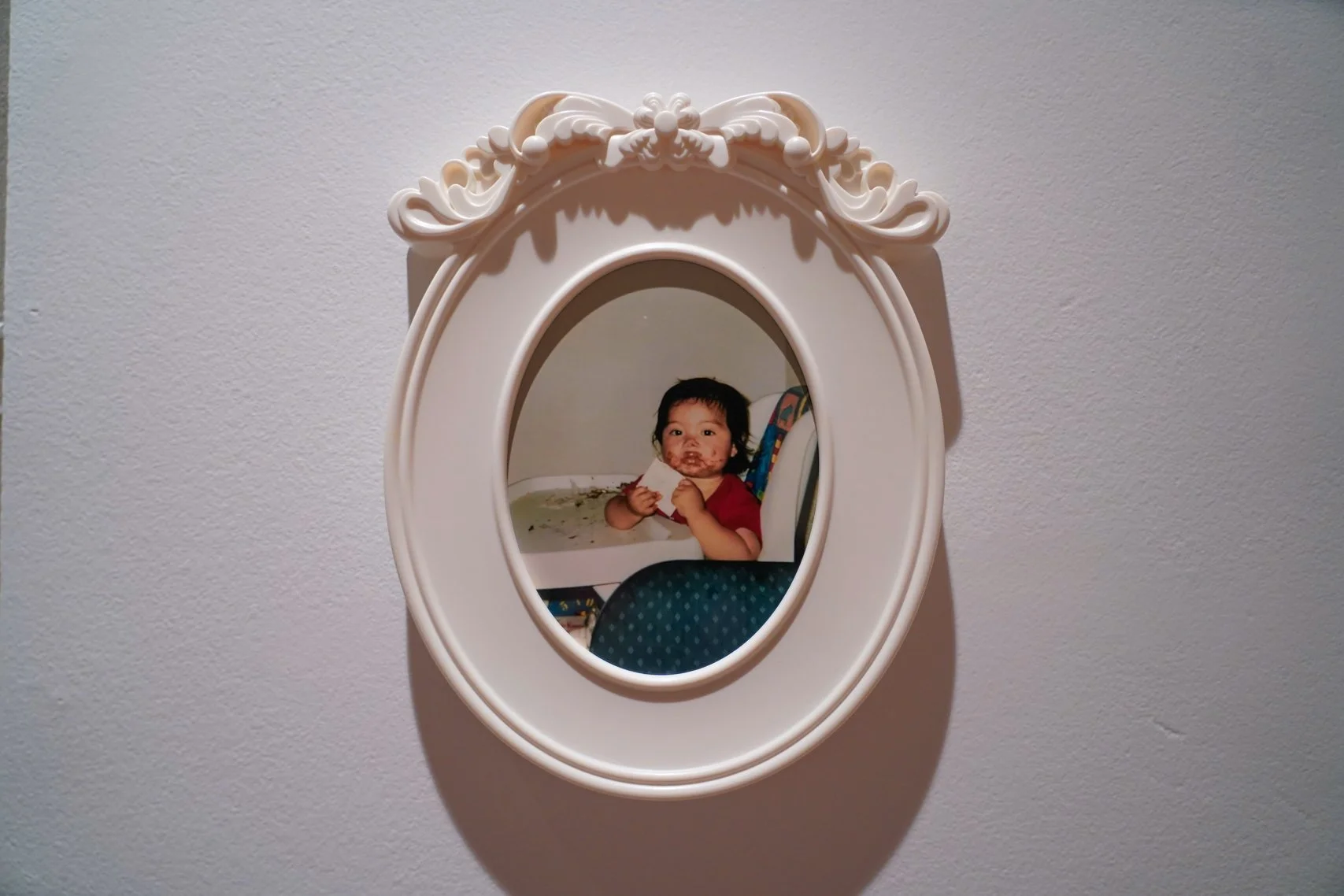
Chismosas seeks to redefine the negative connotations associated with the term for women engaging in gossip (or chisme) by demonstrating that these conversations can be politically constructive, transformative, and an opportunity for women to cultivate community. Chismosas navigates these intricacies by highlighting ways in which domestic spaces function as pivotal hubs for this dialogue.
We recognize that the existence of many domestic spaces is a testament to the history of exclusion in male-dominated spaces. As young women growing into our artistic voices, it’s important for us to have discussions around claiming and creating space for women and nonbinary individuals. Part of our work in creating these spaces has been through co-hosting Collectiva Ella in Mission Gráfica, a space for femme and nonbinary folk with an interest in printmaking to come together. Printmaking, a medium which feels inherently political and conversational for us, is also a medium that has at many points in history excluded women and queer artists. Through our artistic practices, we embrace printmaking as both a political act and a conversation in itself.
We invite visitors to engage with our ongoing conversations by inviting you into our “home”. We invite you to think about the possibilities and importance of chisme, and by extension, the ways in which women have taken advantage of the domestic spaces they have cultivated, despite the existence of these spaces often being a result of exclusion.
Meet the Artist
Alejandra Rubio is a printmaker, cultural curator, and community advocate from San Francisco. She is critical of societal norms and their impact on marginal ized people and is fascinated by the power of radical imagination through the act of dreaming and creating art. This has led her to pursue a career in youth arts education and arts administration while pursuing several independent projects centered in cultivating community and connection.
My path as an artist, researcher, and educator has been greatly influenced by my upbringing, education, and mentorship that I have received while growing into myself in the Bay Area. My family and I moved to San Francisco from Oklahoma when I was 12 years old. My family, like many latino families, found the Mission to be home with the familiar smells of panaderias and friendly brown faces that took us into the community. But like many long term San Francisco residents, home is in many places as many are frequently displaced. Hunters Point became home base and continues to be till this day, the view of the shipyard being one that brings me comfort.
As a teen I was heavily involved with youth social justice groups where I had the opportunity to learn firsthand about social political issues impacting communities of color in San Francisco from several artists and activists in the community. Being involved with these educators, activists, and artists gave me the words to understand the world around me and empowered me to use art as a tool to ex press what I was learning. At 18 I left the city in search of myself and went to study at the University of California, Santa Cruz thinking that I would major in Computer Science. Almost a year into the major I realized that what I actually wanted to do was be of service to my community. I set out to explore other paths and landed on Psychology and Studio Art.
At the intersection of art, social justice, and mental health, I encountered the topic of Radical Imagination. Radical Imagination, as I have come to explore and understand, is the ability to imagine a world beyond the social, economic, political influences that exist today. I continue my work in Radical Imagina tion by working with youth in providing them an arts and activism curriculum. Through my personal practice, I aim to find ways to engage with issues in my community and find constructive ways to use art as a response. Dreaming, imagining, plotting, and scheming being vital for the work that I do as an artist and educator.
Sarai Montes is a diasporic Oaxacan (Ñuu Savi) and Salvadoran artist, born and raised in the Bay Area with an interest in printmaking, illustration, and film/ video art. She has a background in Art Practice, Ethnic Studies and Film from the University of California, Berkeley. She explores themes of transnational identity, Indigenous resistance, and Indigenous feminism. Her work celebrates her communities while also highlighting collective struggles and social issues in order to push others to imagine a better world. Her communities, ancestral memory and the history of art as a tool for resistance all influence her work which embraces the idea of the personal as political.
Sarai Montes es una artista Oaxaqueña (Ñuu Savi) y Salvadoreña en la diáspora, nacida en el Área de la Bahía, con interés en el grabado, la ilustración y el arte de video. Tiene una formación académica en Arte, Estudios Étnicos y Cinematografía de la Universidad de California, Berkeley. Explora temas de identidad transnacional, resistencia Indígena y feminismo Indígena. Sus obras de arte celebran a sus comunidades y al mismo tiempo llaman la atención a luchas colectivas y problemas sociales para impulsar a otros a imaginar un mundo mejor. Sus comunidades, memoria ancestral, y el uso histórico del arte como forma de resistencia política inspiran su trabajo que adopta la idea de lo personal como político.
Artist Apprentice Statement & Acknowledgements:
The opportunity to be an Artist Apprentice allowed me to connect with other people who share a passion for printmaking, and in particular printmaking that is tied to social movements. I was able to hone in on my passion for screen printing as well as experiment with new methods of printmaking. I feel grateful for the opportunity to print at Mission Gráfica which has a long history of printmaking in support of movements for the people. Co-hosting Colectiva Ella in this historical space also made me feel gratitude for the growing access to printmaking for people who have historically been excluded from many art spaces. I would like to thank the Mission Cultural Center and Dr. Martina Ayala for welcoming me into their space. I would also like to thank Alejandra Rubio for being such a wonderful friend and my collaborator throughout this process. Thank you to Calixto Robles for sharing space with us and giving us advice and support. Thank you to my family and friends, my Pueblo, and the different communities that have helped shape and raise me. I would also like to thank everyone who walked through Gráfica this past year and shared a skill with us, talked to us about our ideas, showed us their art, or stopped by our printmaking collectives. Thank you to anyone who has taken the time to stop by and visit Chismosas. During our time as apprentices, Ale and I spent time thinking, talking, and printing posters in support of Palestine. I would like to express my gratitude to the Arab Resource and






























